Eccentric and edible: England's attachment to vegetables
- Published
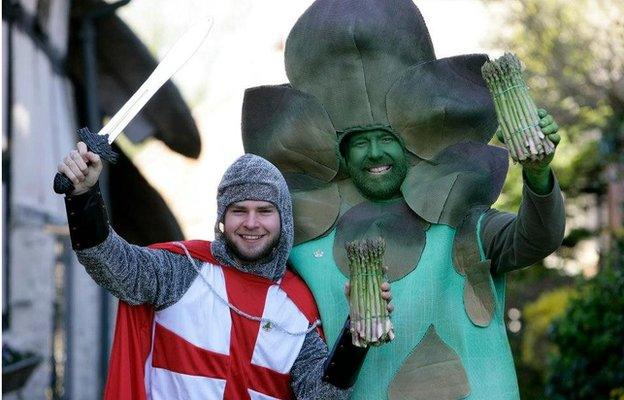
Asparagus and St George are celebrated as being quintessentially English at the Evesham Asparagus Festival
Vegetables. Not a word which immediately conjures up joy, celebration, and a great day out. But across England, towns and villages hold annual fairs - or often "fayres" - in honour of the humble onion, the delicate asparagus and peppery watercress.
England's festivals in celebration of both fruit and vegetables may not have the exuberance of Spain's Tomatina - where participants hurl tomatoes at each other in a frenzy of delight - but English stiff upper lips unfurl enough to sing the praises of peas, rhapsodise over rhubarb, and cheer about cherries.
And while not the foodie heaven of France, it is worth taking a tour around England's green and pleasant land to enjoy the delights of the edible and the eccentric.

Moved to tears
Newent Onion Fayre, Gloucestershire
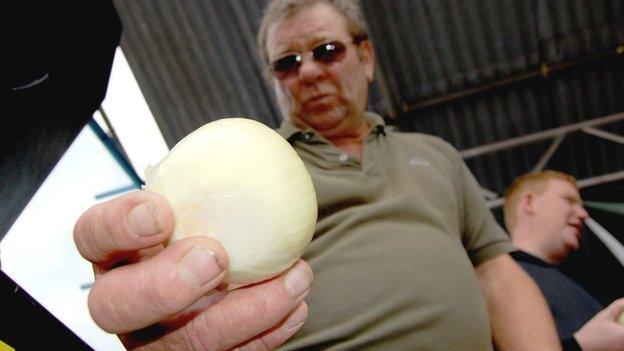
In the 13th Century, drovers from Wales would pass through the village of Newent and stock up on onions at the onion fayre. The market survived until the beginning of the 20th Century, when it dwindled through the war years.
But the event was resurrected in 1996 as a way to showcase - in the words of the organisers - the "magnificent onion".
Now in its 19th modern year, it hosts an onion-eating competition, an onion show, a biggest onion contest, demonstrations of onion recipes, and a competition for the best onion character.


Gone today, hair tomorrow
Alresford Watercress Festival, Hampshire
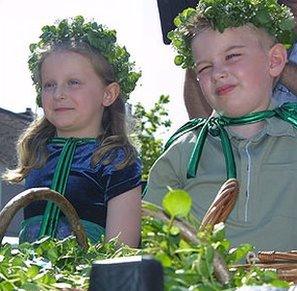
Arlesford crowns a watercress king and queen every year
Watercress has been used historically to remedy hair loss and was used by Roman generals to help them make bold decisions.
Alresford, then, should be full of hirsute risk-takers, as it prides itself on being the UK's "capital of watercress".
Streets come to a standstill as the first watercress, freshly cut from a nearby farm, is brought into town on a traditional horse and cart.
The newly-crowned watercress king and queen ride on the cart and hand out the peppery crop to the public.
Why watercress?

Eliza James, the original 'watercress queen'
It stems back to the original "watercress queen", Eliza James, who created vast watercress beds in Hampshire.
Born in the mid-1800s, by the age of five she was already hawking bunches of wild watercress around factories in Birmingham, later moving to London and establishing a near monopoly on the city's watercress restaurant and hotel trade.
She set up her own farms, becoming the biggest owner of watercress sites anywhere in the world.
At the time of her death in 1927 at the age of 72, the company she founded was handling 50 tonnes of watercress every weekend.
Her fields are still used for watercress production.


Night stalkers
Wakefield Rhubarb Festival, West Yorkshire
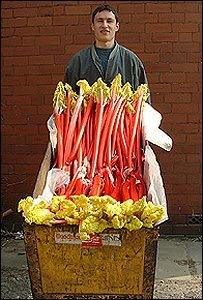
Proud exhibitors show off their rhubarb
Although the plant is a native of Siberia, a 9-sq-mile (23-sq-km ) region between Wakefield, Morley and Rothwell has become known as the "Rhubarb Triangle", famous for producing early forced rhubarb.
West Yorkshire once produced 90% of the world's winter forced rhubarb, which is not a fruit but a vegetable, and grown in the dark.
The 10-day festival includes rhubarb tasting, rhubarb recipes, and tours of rhubarb sheds - which are so popular they are ticket-only events.
Too tart to eat raw, the cook's default is crumble, although chef Gregg Wallace recommends having it with gammon.
Over the years, farmers in the Rhubarb Triangle have developed secret methods to produce the most tender and sweet version of rhubarb.
It is thought many of the closely-guarded techniques involve an upturned bucket.


Growing, growing, gone
Evesham Asparagus Festival, Worcestershire
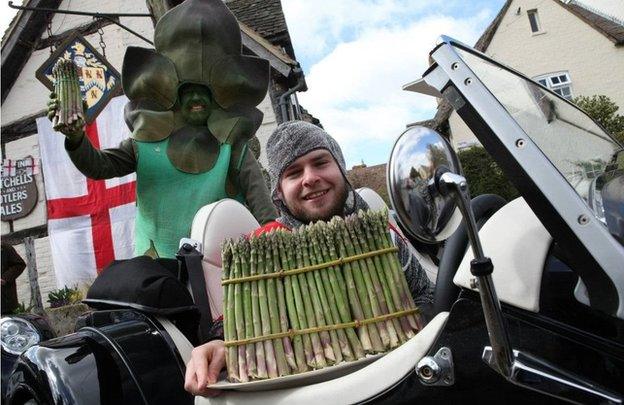
Festival mascot, Aspara-Gus and St George celebrate at the Fleece Inn, Bretforton
A vegetable with only an eight-week season, asparagus has the unusual distinction of being both an aphrodisiac and a diuretic.
Asparagus has been a tasty delicacy for millennia - methods for cooking it are in the oldest surviving book of recipes, (if you are not familiar with it, it is Apicius's first-century AD De Re Coquinaria), but the vegetable only became popular in England in the 16th Century.
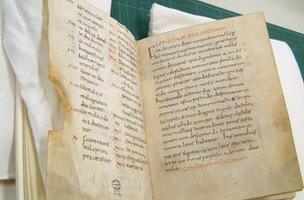
The oldest surviving cookery book includes recipes for asparagus
Asparagus beds take about three years before they can be harvested, but once established the spears can grow as speedily as an inch every hour.
Arthur Young, an 18th Century agriculturalist, visited Evesham in 1768 and his book, A Six Months Tour of the North of England, published in 1771, documents how asparagus was carried from Evesham to Bath and Bristol.
The Round of Gras in nearby Badsey lays claim to being the only pub in the world to be named after a bunch of asparagus.
The festival includes the crowning of the asparagus king and queen, asparagus-eating competitions, and a display from an "asparamancer" - who predicts the future by reading the way stalks fall on the floor.
Predictions for 2014 include: the weather situation in the Far East will worsen, a supergroup will announce it is splitting up, and sportspeople will have a miserable and unsuccessful year.


Give peas a chance
Peasenhall Pea Festival, Suffolk
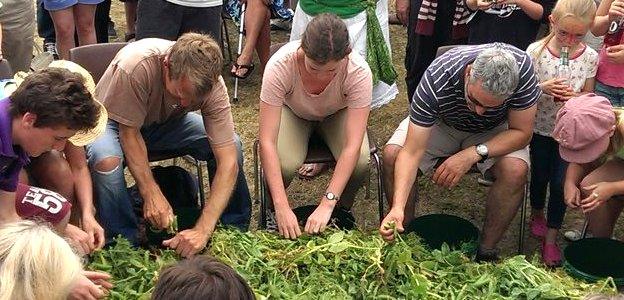
The pea podding World Championship is held at Peasonhall Pea Festival
One of the earliest crops cultivated by man, more than 1,000 varieties of pea are in existence today.
Most of England's peas are grown in East Anglia or Lincolnshire, and only 5% are sold fresh.
Britain's top-selling frozen vegetable, nearly 200-sq-miles (about 500-sq-km) of peas are grown annually for human consumption and nearly 300-sq-miles (about 800-sq-km) for animal feed.
The name of Peasenhall is thought to have come from the Middle English for "where peas are grown".
Visitors to the festival can join in pea-related games, share pea recipes and even have a shot at becoming a world champion at the World Pea Podding Championship.
"We are quite confident in saying it is the World Pea Podding Championship," its organisers said, "because it is the only pea podding championship."


Cherry on top
Faversham Cherry Festival, Kent

Perhaps the ultimate "I-can't-stop-eating-them" fruit, all things cherry are celebrated at this two-day festival.
Keen spitters can try their hand - or rather their mouth - at breaking a world record at this cherry fete.
The current holder of the cherry stone spitting world record, external is Brian Krause of the USA. He managed to project his pip 28.5m (93ft 6.5in).
People unconcerned about their waistline may like to enter the pie-eating competition.
Cherry-tasting, cherry displays, and cherry experts are also on offer.


Plumming the depths
Pershore Plum Festival, Worcestershire

If sugarplum fairies dance in your head, you could do worse than head to Pershore, where an annual plum festival is held in honour of its orchards which date back to medieval times.
A 1920s poster advertising the event described it as the "largest plum show on earth" - not that there was much competition - and in 1927, Great Western Railways enhanced the town's reputation by naming a train "The Pershore Plum, external".
Festival highlights include a "plum charmer", who plays his clarinet to the fledgling plums - thus ensuring a bumper crop. He follows in the 400-year-old footsteps of Thomas Nevill, a farmer who swore that his plums tasted sweeter after he had played the penny whistle to them.
The festival draws in the celebrities too - Antiques Roadshow stalwart Henry Sandon is usually in attendance, impressionist Alistair McGowan is the event's patron and actor Trevor Harrison (who plays Eddie Grundy in The Archers) has also been known to grace the event with his presence.
Proud of its plum-related heritage, in 2011 the town council wanted new streets named after varieties of the amygdaloideae.
But the district council pulled rank and told it to abandon its fruity ideas. The streets were named after war heroes instead.
